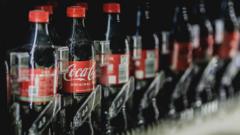Coca-Cola may increase its utilization of plastic bottles in the United States if the tariffs imposed by President Donald Trump lead to higher costs for aluminum cans, as stated by CEO James Quincey during an investor call. Trump's recent 25% import tax on steel and aluminum is expected to escalate the prices of canned beverages, prompting the beverage giant to rethink its packaging strategy.
In light of these developments, Coca-Cola has reduced its ambitious sustainability goal from utilizing 50% recycled materials in packaging by 2030 to a more tempered target of 35% to 40% by 2035. Environmental advocates have criticized Coca-Cola, labeling it the "top global plastic polluter" for six consecutive years.
Quincey remarked, “If one package suffers some increase in input costs, we continue to have other packaging offerings that will allow us to compete in the affordability space," suggesting a potential increase in the use of PET plastic bottles should aluminum prices rise. He also emphasized that the added costs from packaging represent only a small fraction of the company’s overall expenses.
Coca-Cola's shift towards aluminum containers in recent years aligned with its marketing and sustainability strategies, though aluminum cans are generally considered more recyclable compared to plastic. Despite the higher price point, the environmental implications of switching back, given the U.S. imports nearly half of its aluminum, raises significant concerns.
Trump’s administration previously provided exceptions for can-makers from the steel tariffs; however, this time, no exemptions are being offered. The situation is exacerbated by recent governmental actions, including an executive order that halts efforts to transition from plastic to paper straws, reversing former President Joe Biden's stance on the issue of plastic pollution, which he deemed a "crisis."
In light of these developments, Coca-Cola has reduced its ambitious sustainability goal from utilizing 50% recycled materials in packaging by 2030 to a more tempered target of 35% to 40% by 2035. Environmental advocates have criticized Coca-Cola, labeling it the "top global plastic polluter" for six consecutive years.
Quincey remarked, “If one package suffers some increase in input costs, we continue to have other packaging offerings that will allow us to compete in the affordability space," suggesting a potential increase in the use of PET plastic bottles should aluminum prices rise. He also emphasized that the added costs from packaging represent only a small fraction of the company’s overall expenses.
Coca-Cola's shift towards aluminum containers in recent years aligned with its marketing and sustainability strategies, though aluminum cans are generally considered more recyclable compared to plastic. Despite the higher price point, the environmental implications of switching back, given the U.S. imports nearly half of its aluminum, raises significant concerns.
Trump’s administration previously provided exceptions for can-makers from the steel tariffs; however, this time, no exemptions are being offered. The situation is exacerbated by recent governmental actions, including an executive order that halts efforts to transition from plastic to paper straws, reversing former President Joe Biden's stance on the issue of plastic pollution, which he deemed a "crisis."


















